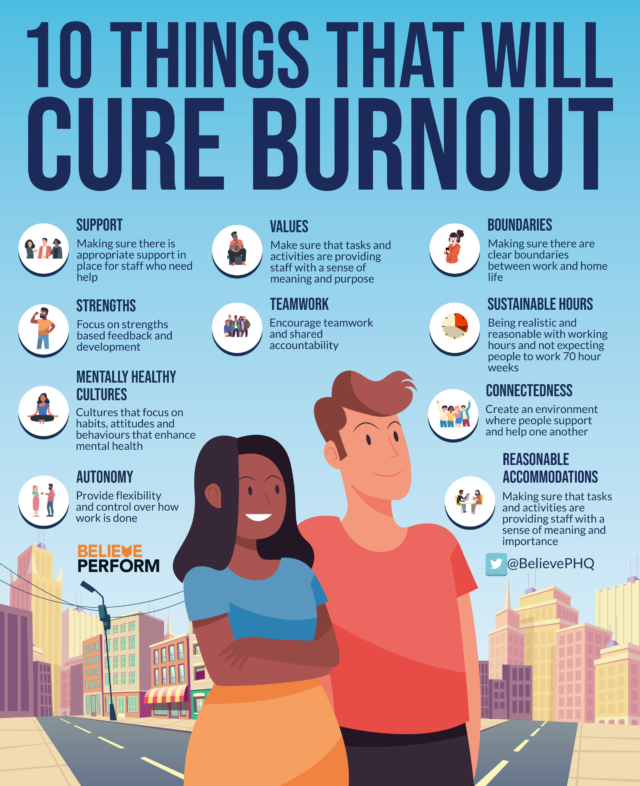Burnout is a problem that can’t be solved without changing work culture. More meditation, extra yoga, further self-care, additional team building days, time off from work and a ping pong table in the cafeteria are not the solution to a problem that is widespread across the globe. Employers need to stop blaming employees for not being tough or resilient enough and instead address the true issues within their culture that are damaging wellbeing and focus on building cultures that positively contribute to life and wellbeing.
There is not a one size fits all approach to addressing burnout and it is important that we are aware of the role individuals play and the nature of different jobs. Every workplace has different demands that they are facing, and some professions can be more stressful than others (E.g. teaching). It is also important for us to acknowledge the role that we all must play within burnout. We are all responsible for our own wellbeing/happiness and there will be times throughout our life where we might make unhealthy decisions that make us feel more stressed or anxious. Being aware of the signs and symptoms of burnout and putting resources in place to alleviate symptoms is just one way that we as individuals can positively contribute towards reducing the problem.
Employees who feel unsupported by their managers are 70% more likely to experience burnout. Employees are 70% more likely to succumb to burnout when faced with unreasonable time restraints
Is there a solution?
There are many solutions to addressing burnout and often they are reactive interventions or programmes focused on stress management or resilience. I don’t believe that these interventions are going to make a difference within a world where people have limited time and resource. Rather than focusing on what can we do to reduce burnout I would encourage organisations to think about how workplace cultures can positively contribute to life and wellbeing. This is a healthier and more proactive outlook that focuses on making sure that we are meeting some of the most basic human needs of people at work.
Instead of thinking about how we can make staff more resilient and better at coping with stress, we need to be building cultures that enhance health and wellbeing and provide people with a sense of purpose. Cultures that people want to be part of. Cultures where people feel connected to others and have opportunities to grow. Cultures where people have autonomy and control over decisions. Cultures where people feel safe to talk about how they are feeling and what they are thinking. Cultures where people are appreciated, acknowledged, and listened to.
So, the next time you are thinking about burnout and what training you can offer to make staff more resilient I would urge you to look at your culture and think about what habits and behaviours you can implement that will provide people with a sense of purpose, meaning and nourishment. I urge you to think about how your organisation can positively contribute to people’s life and wellbeing through everyday habits and behaviours.
If you would like to learn more about how we build healthy high performing cultures and the approach we adopt, please get in touch.



